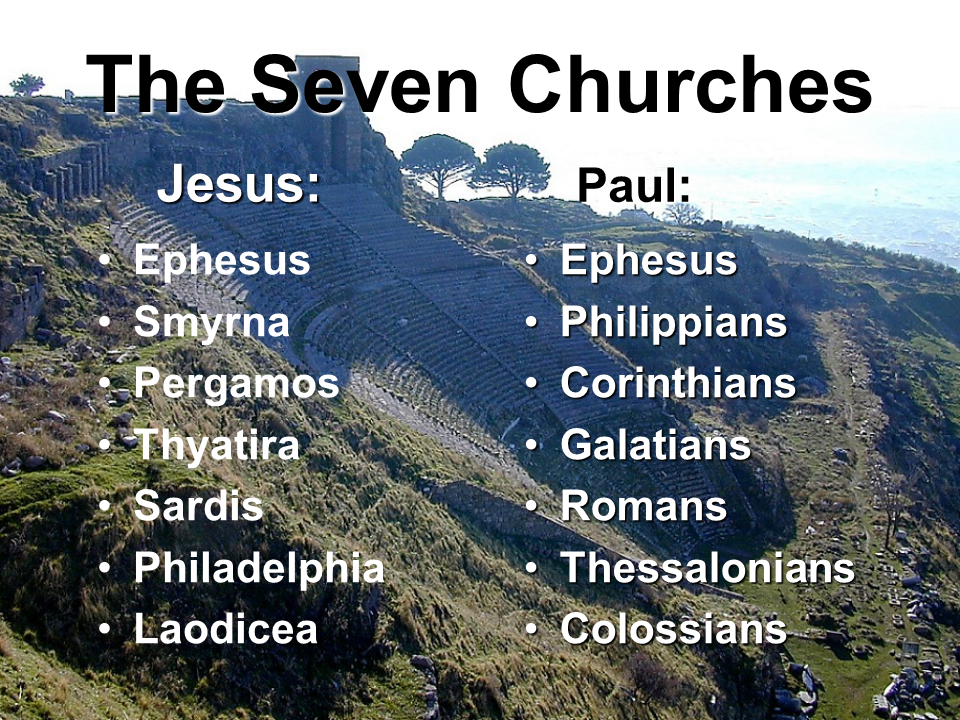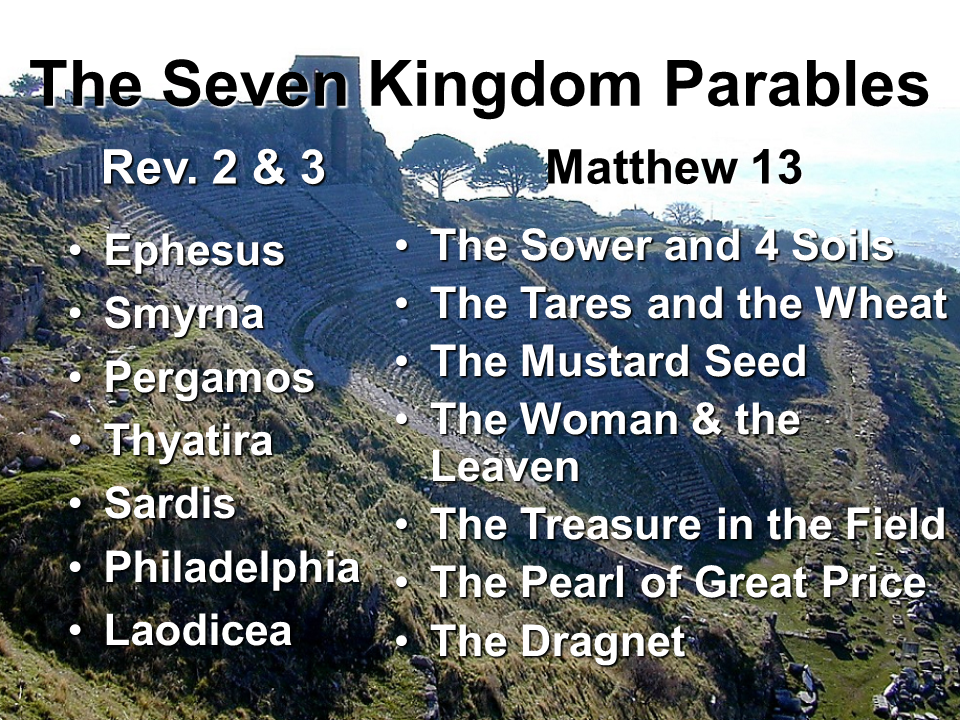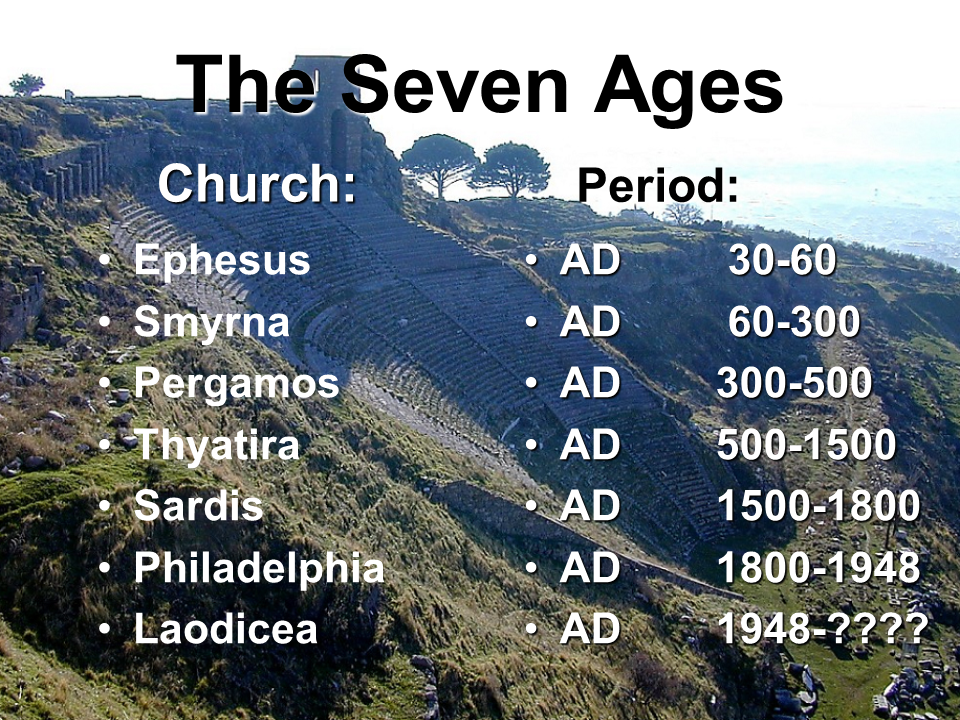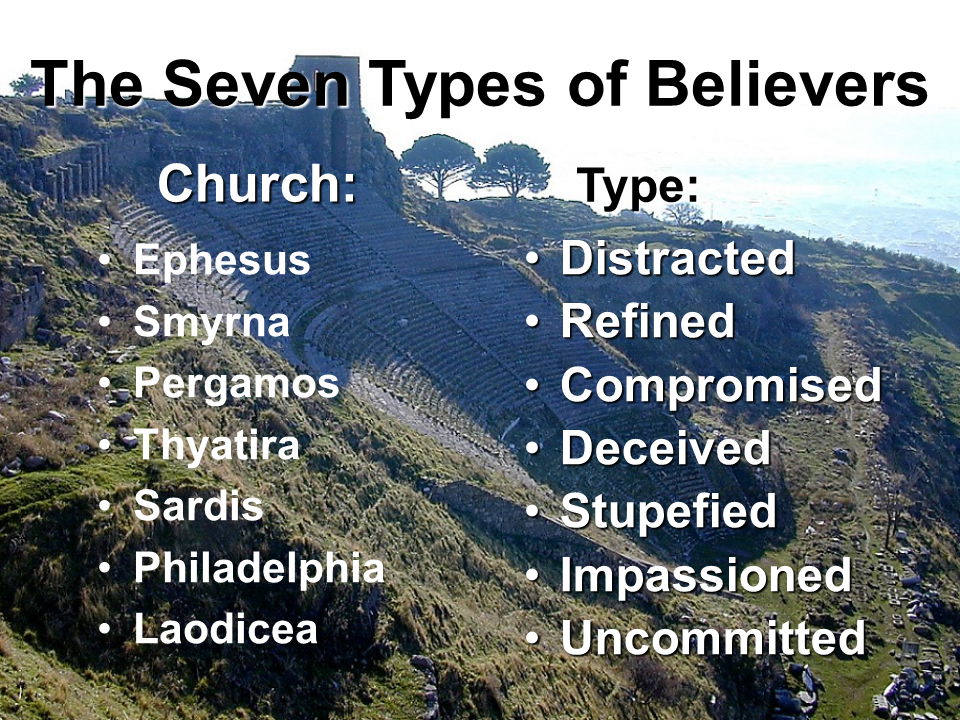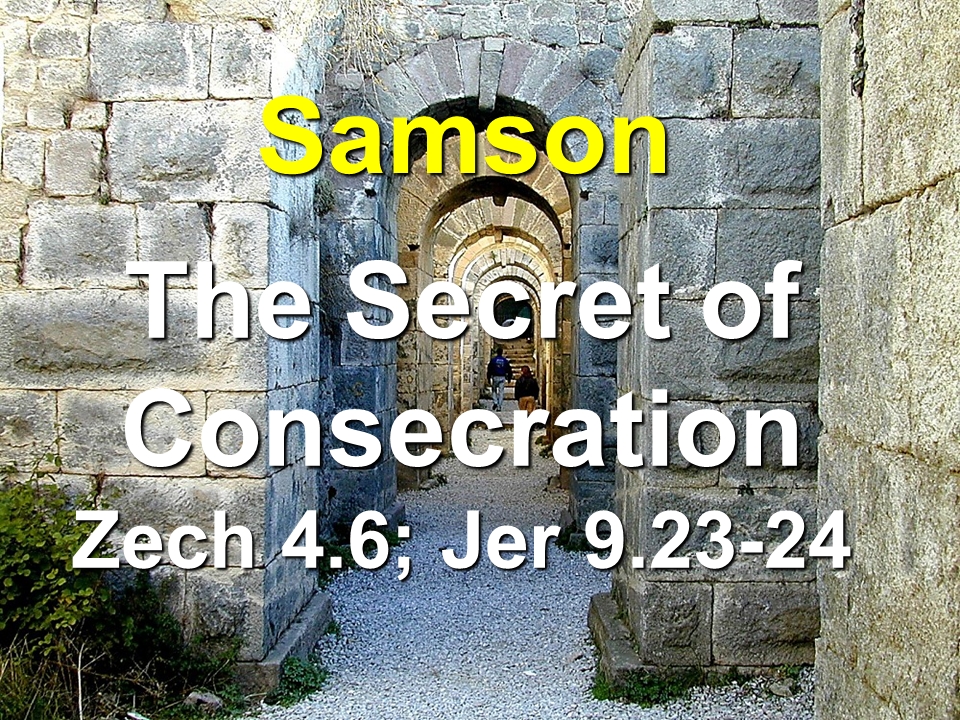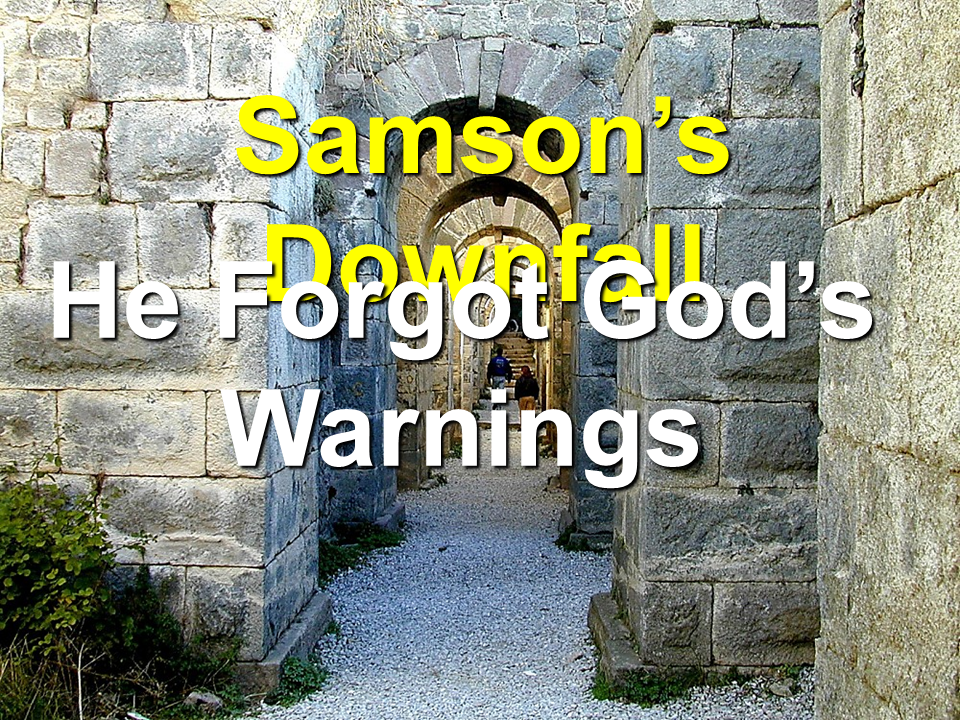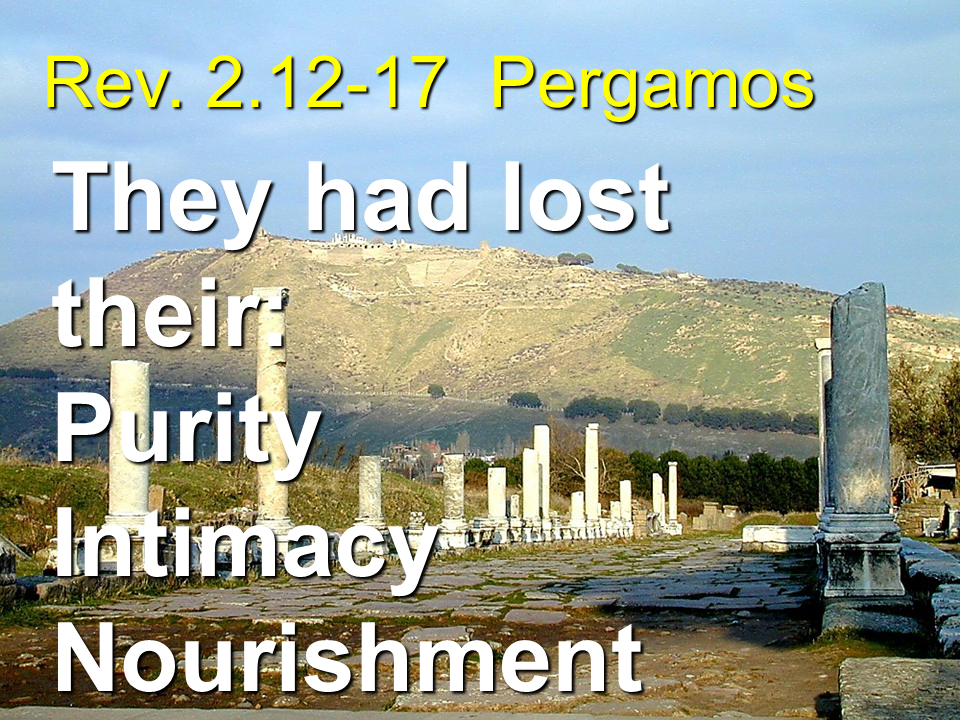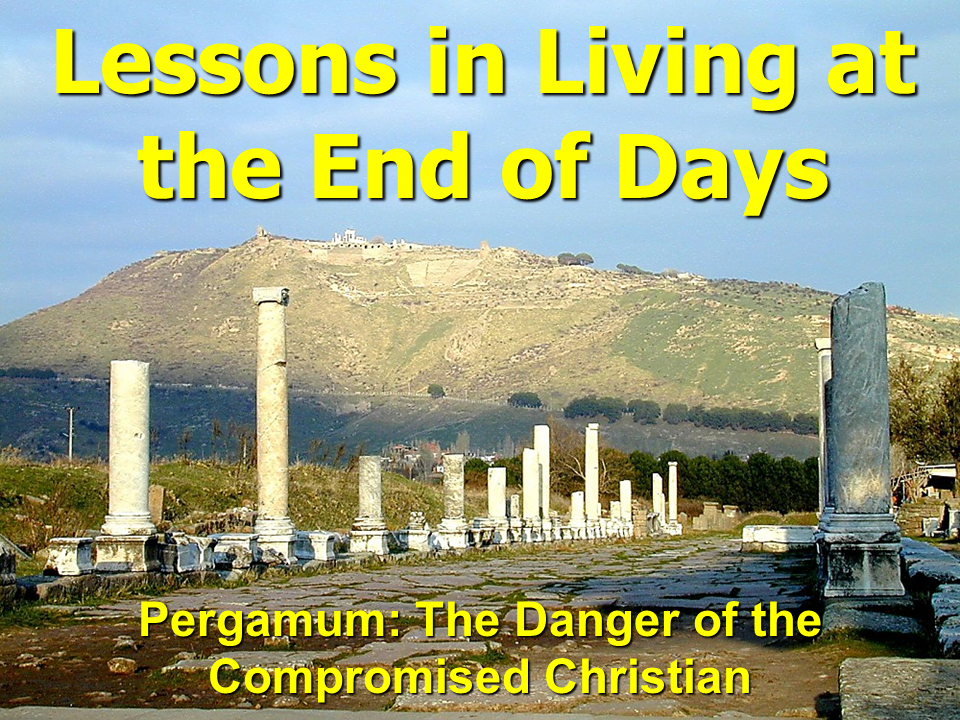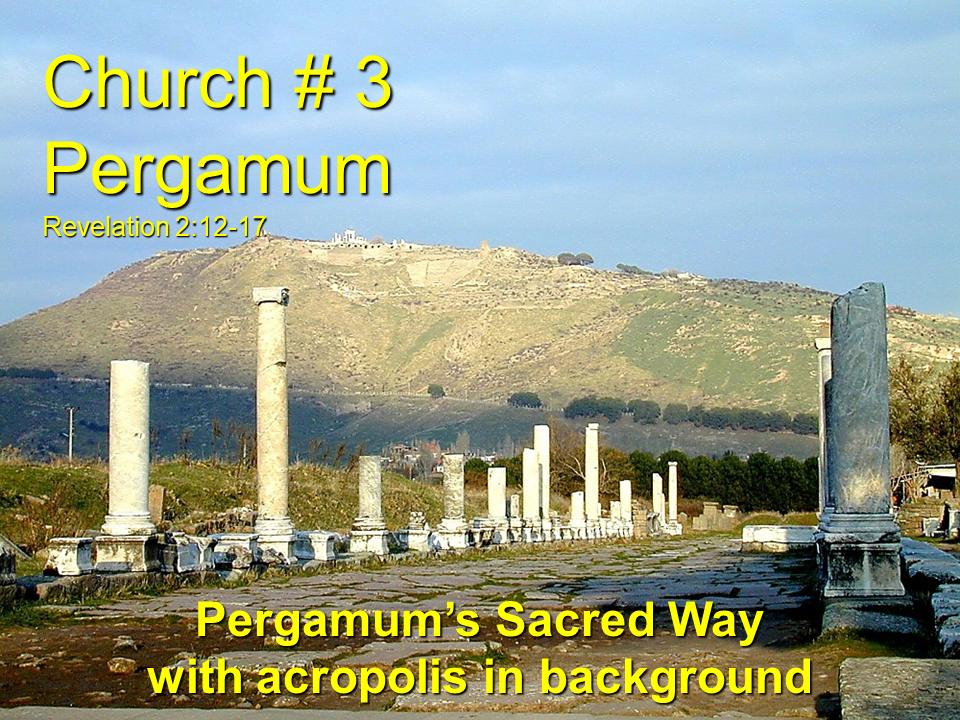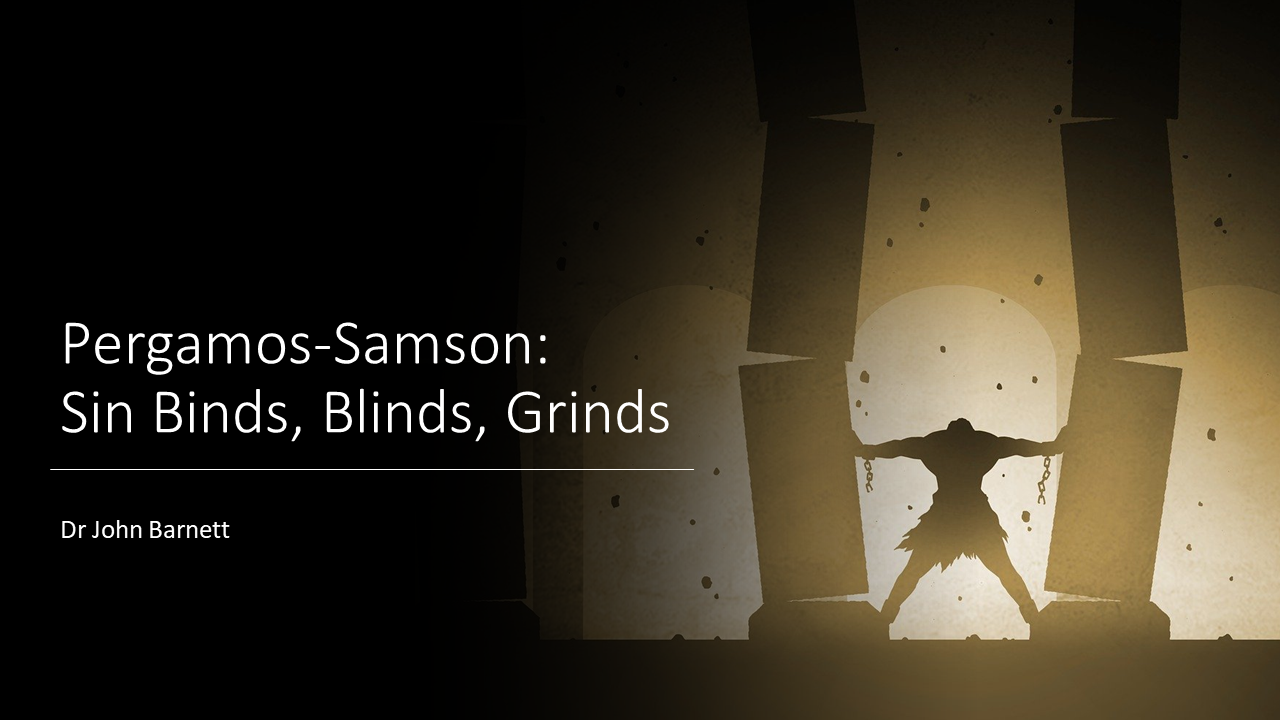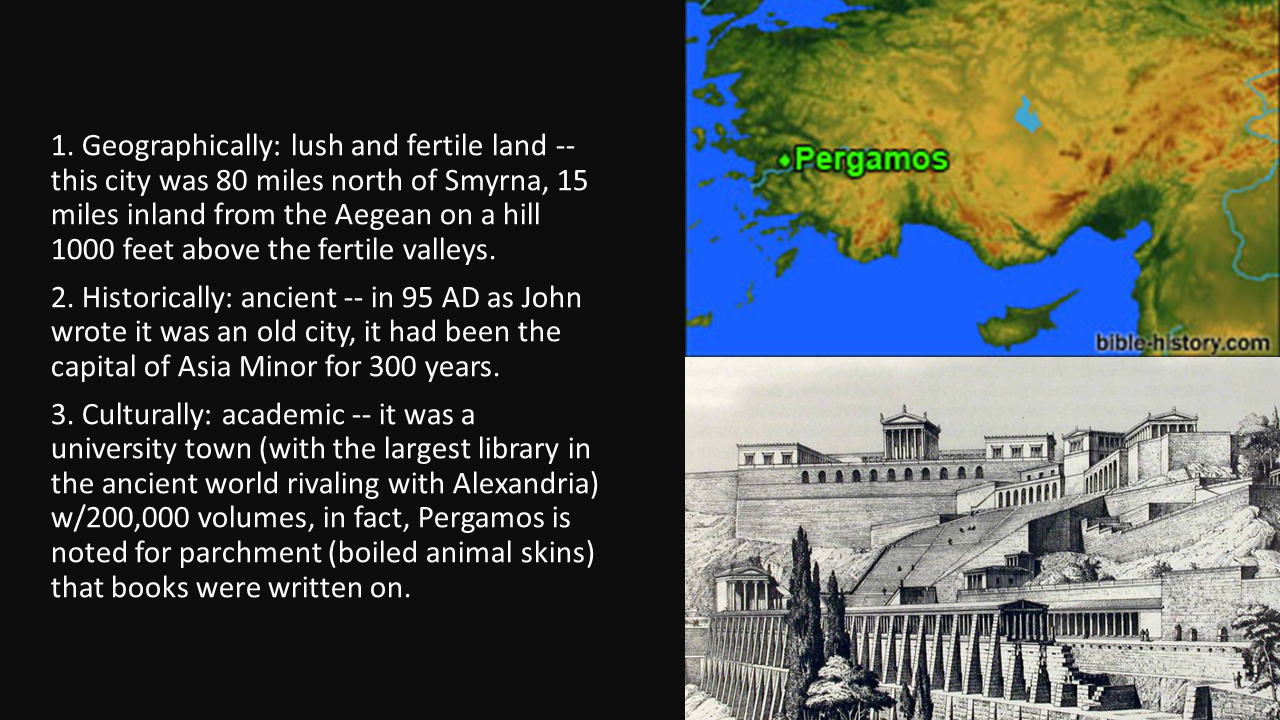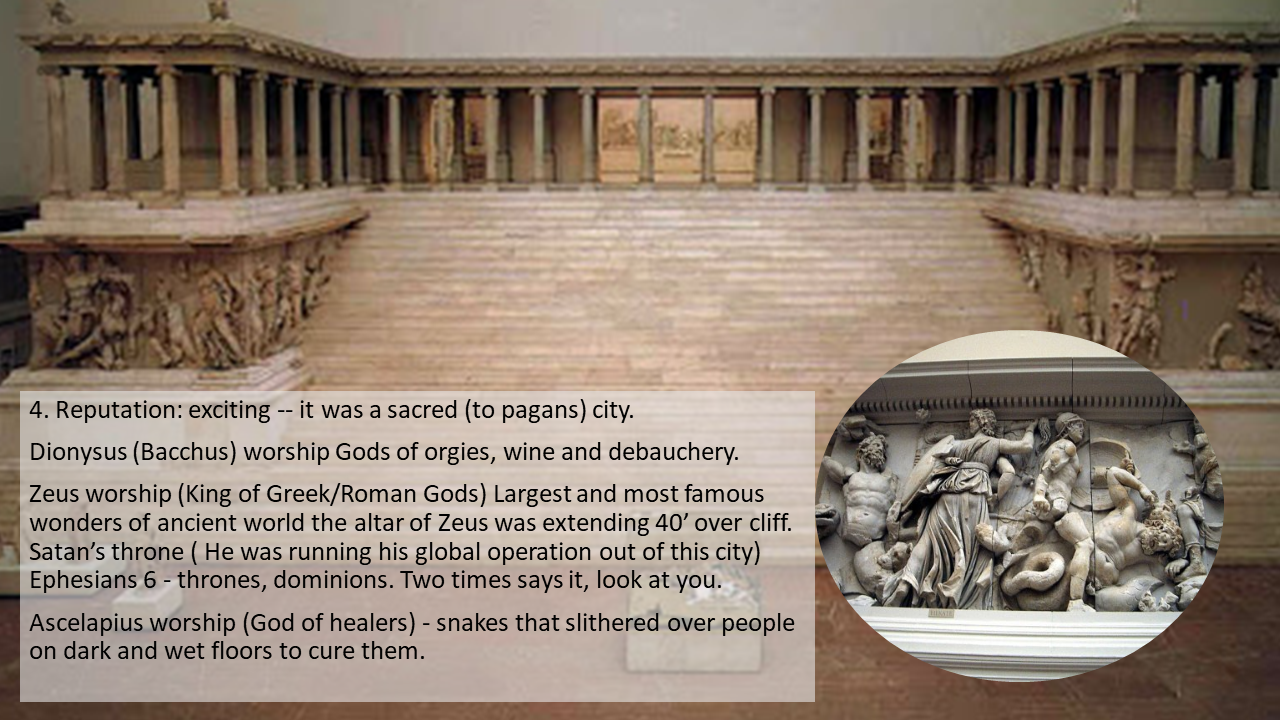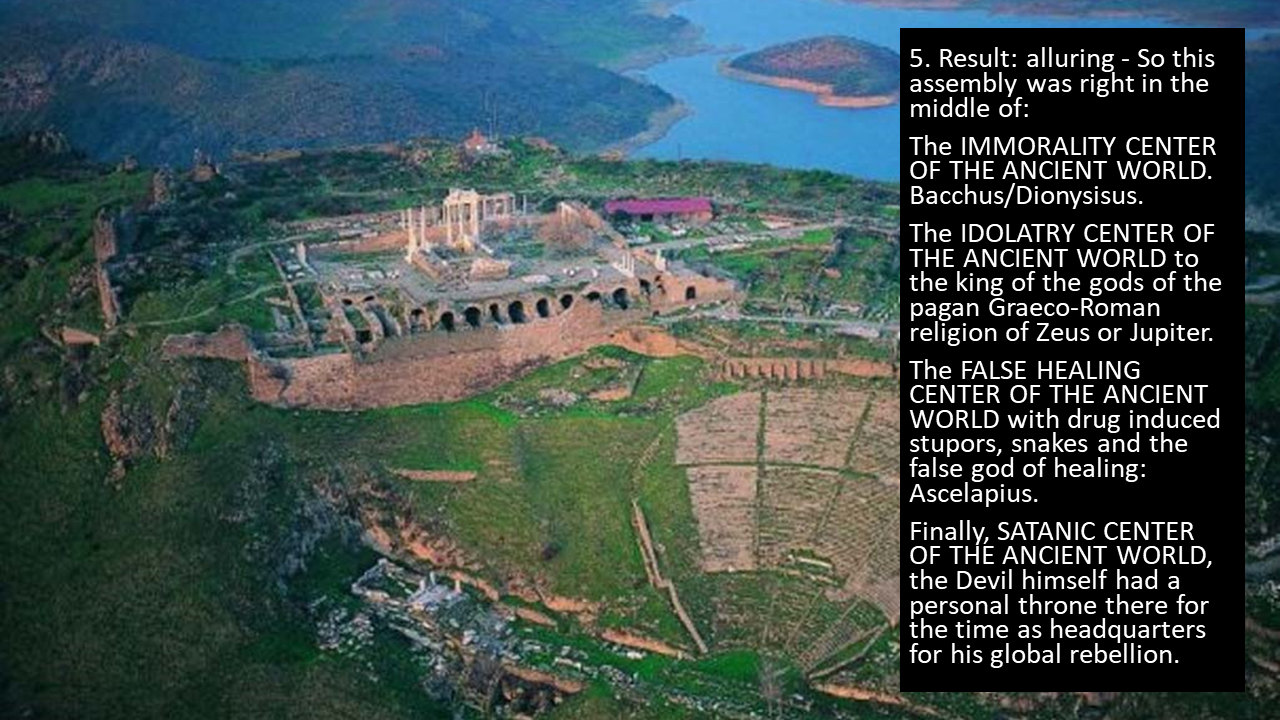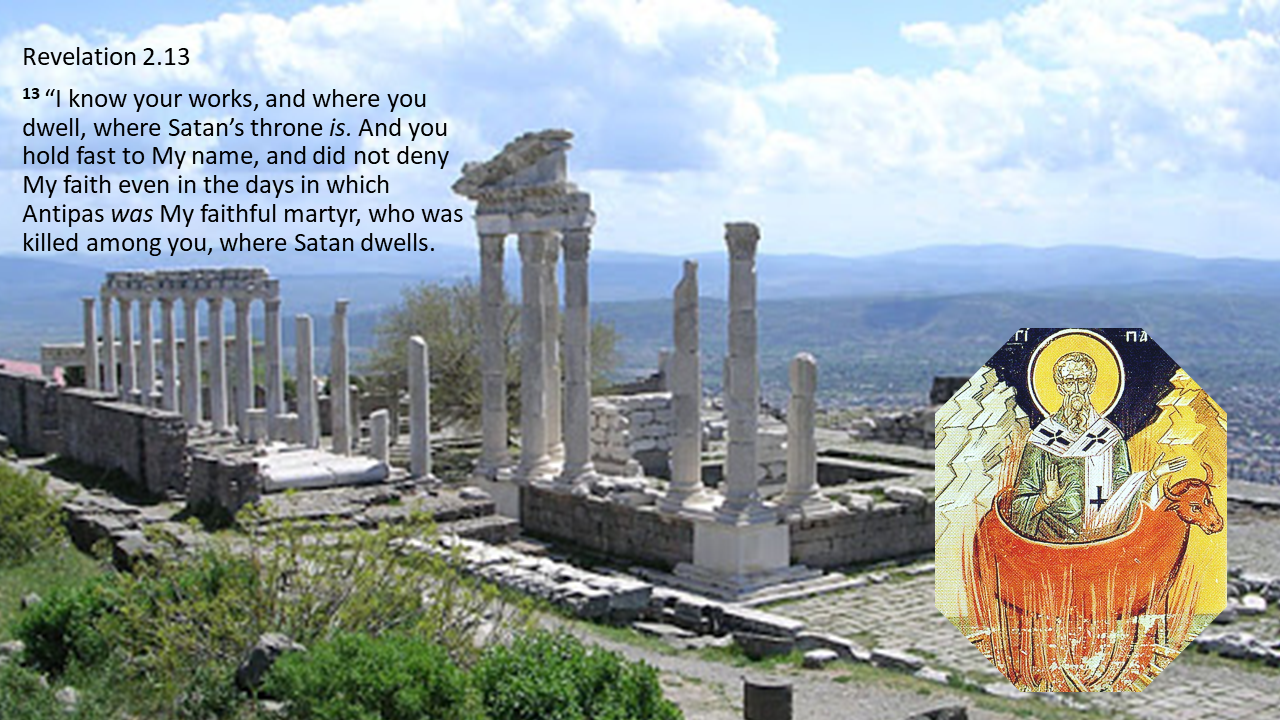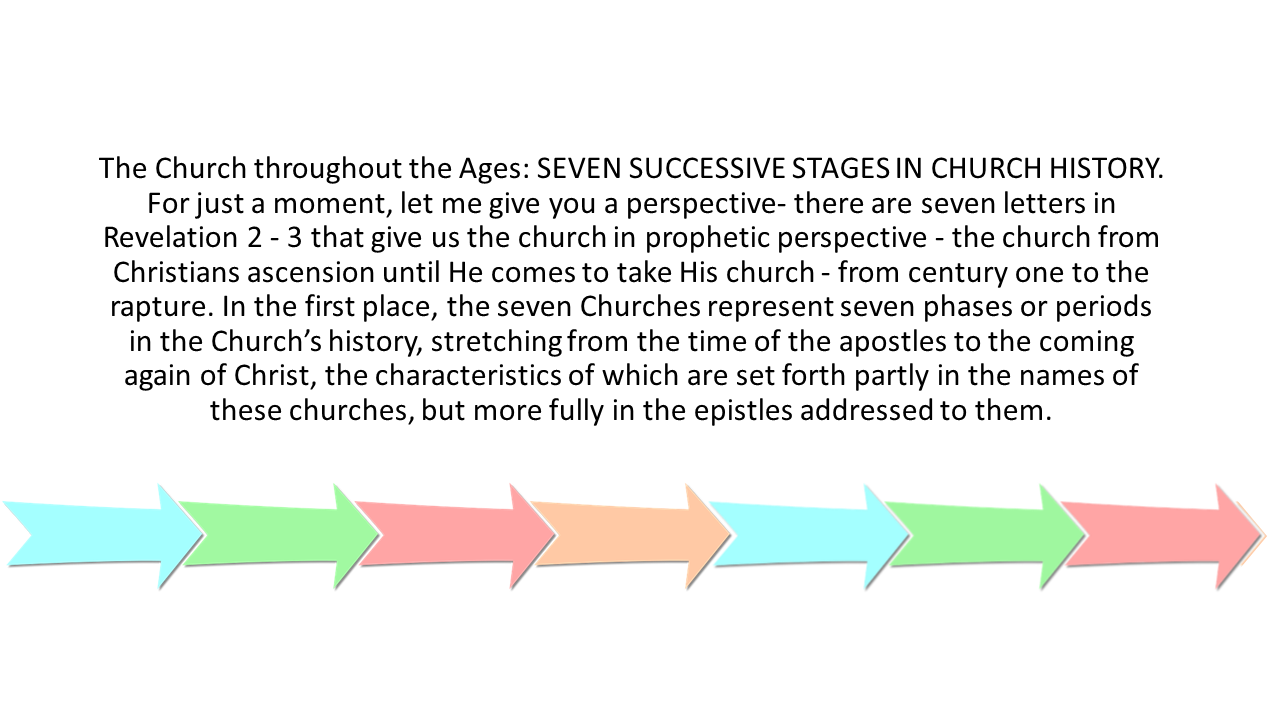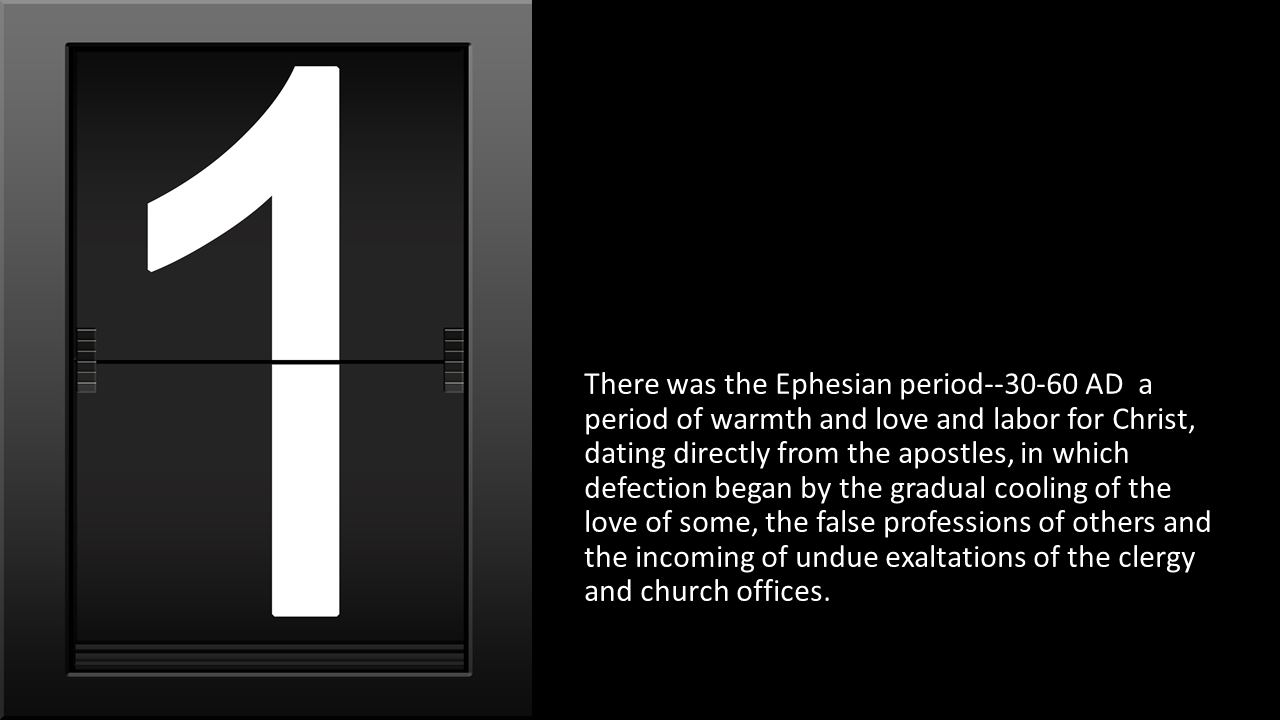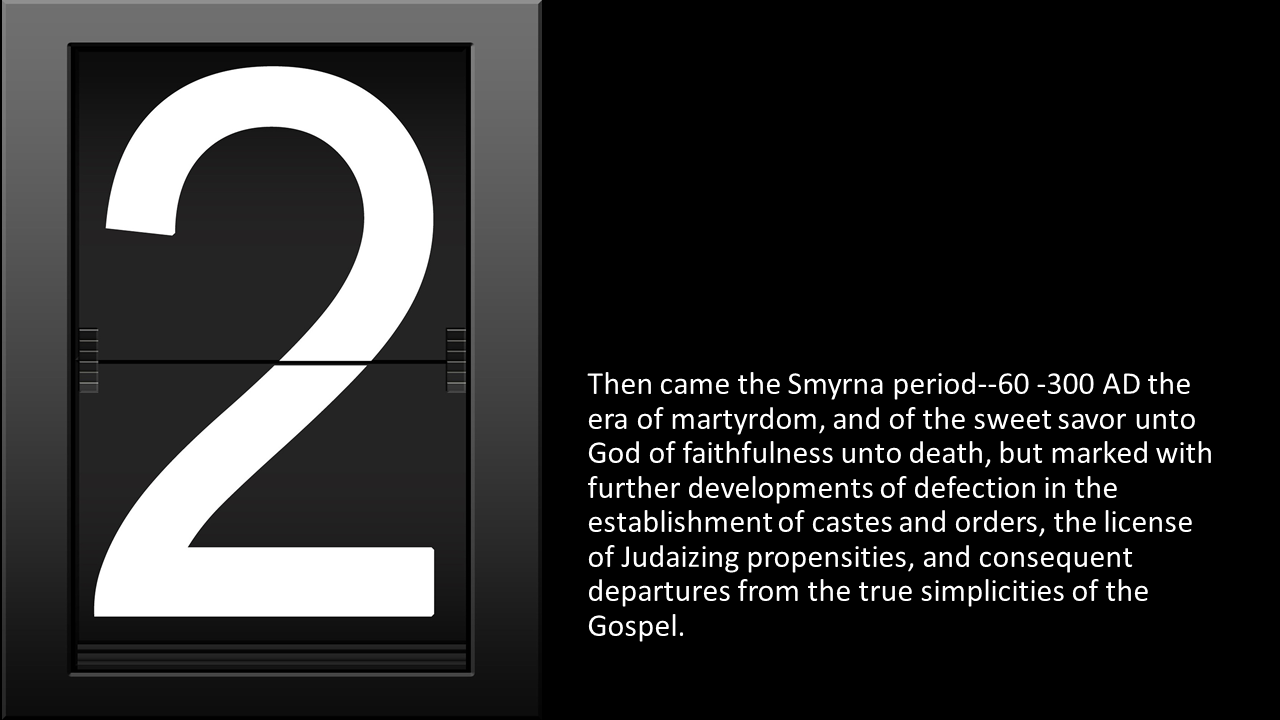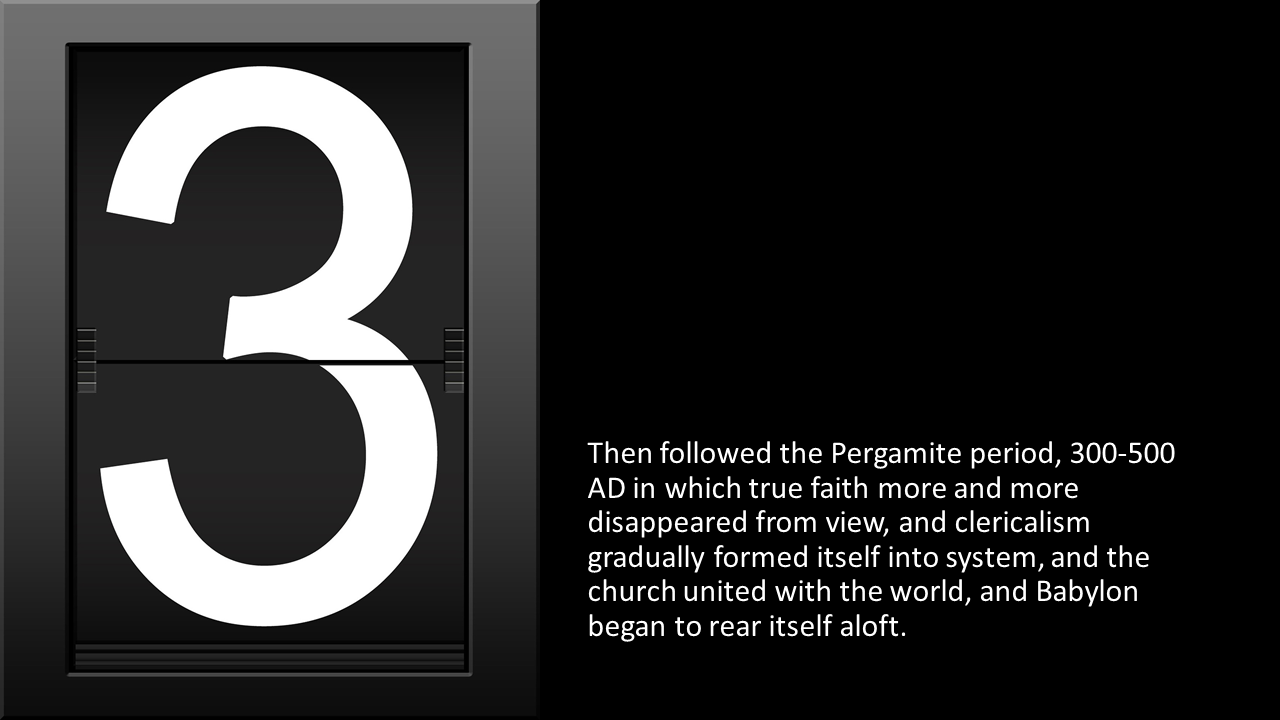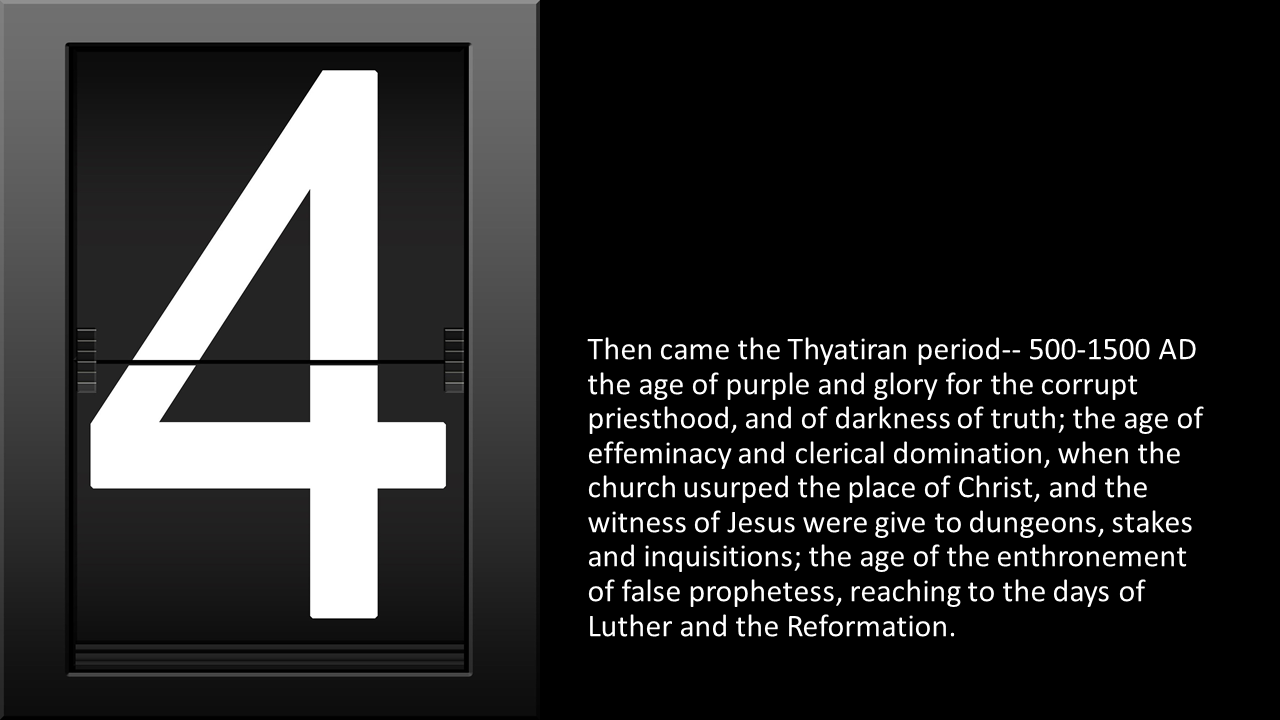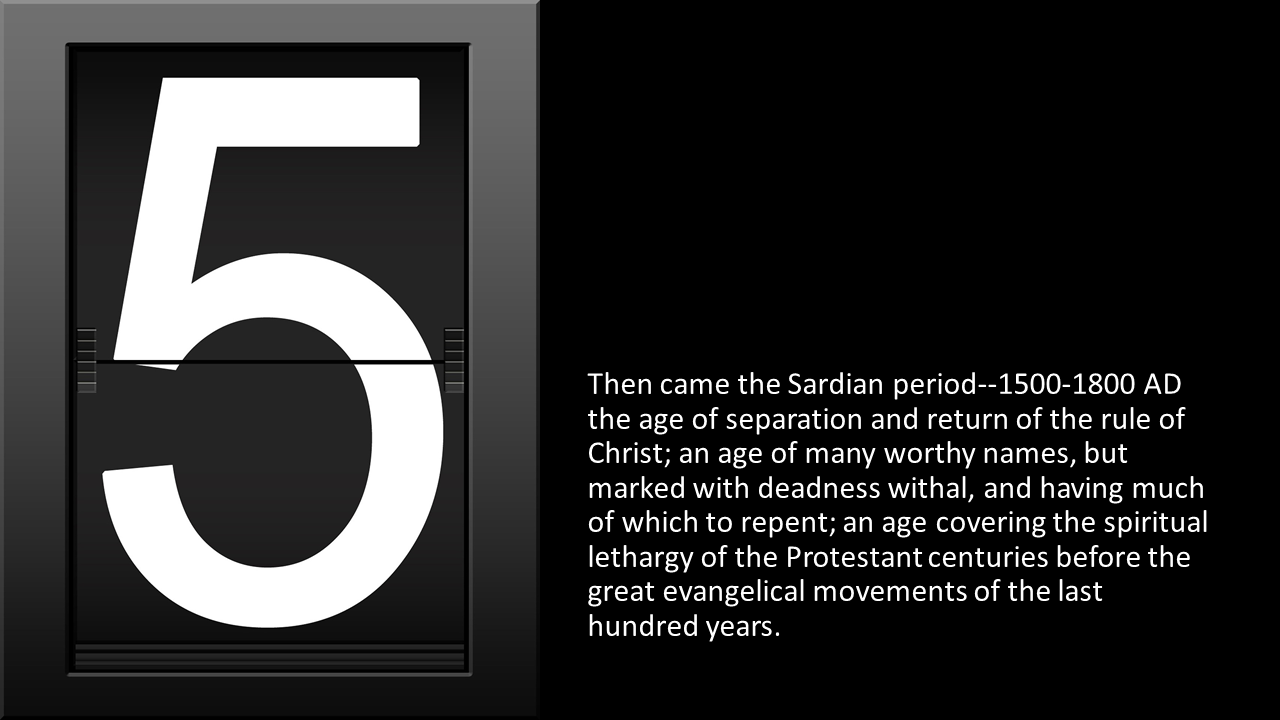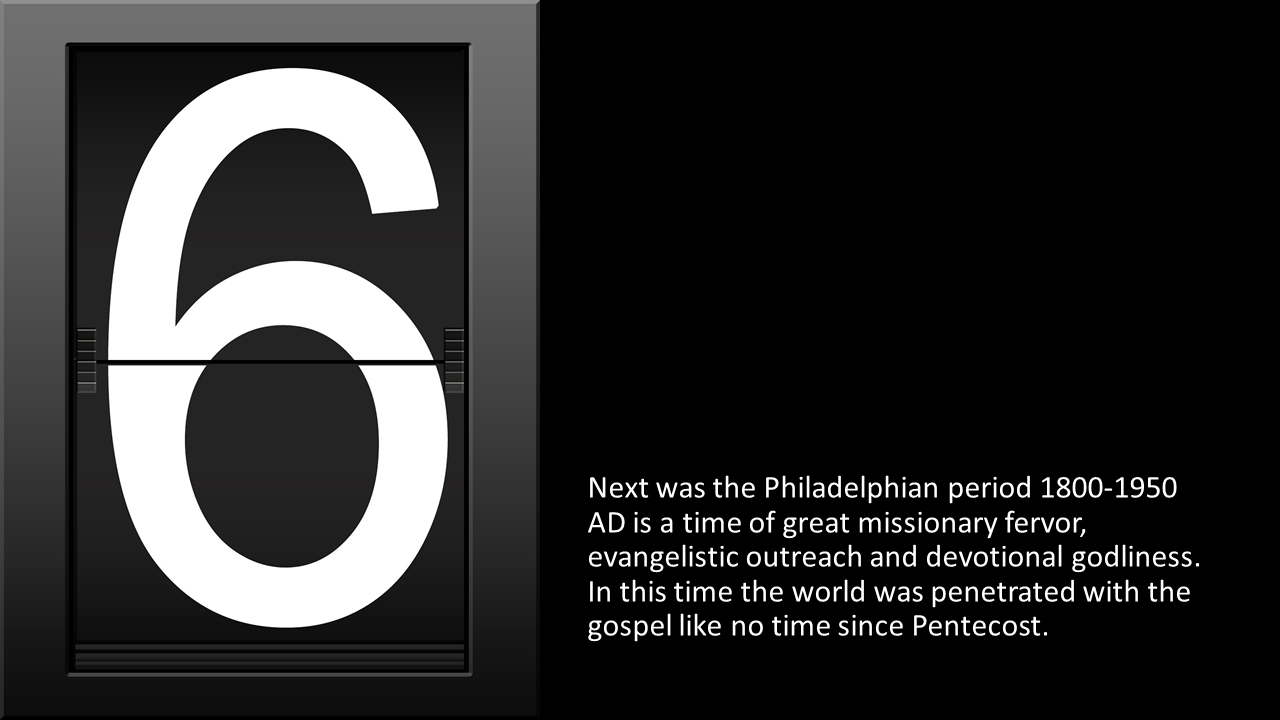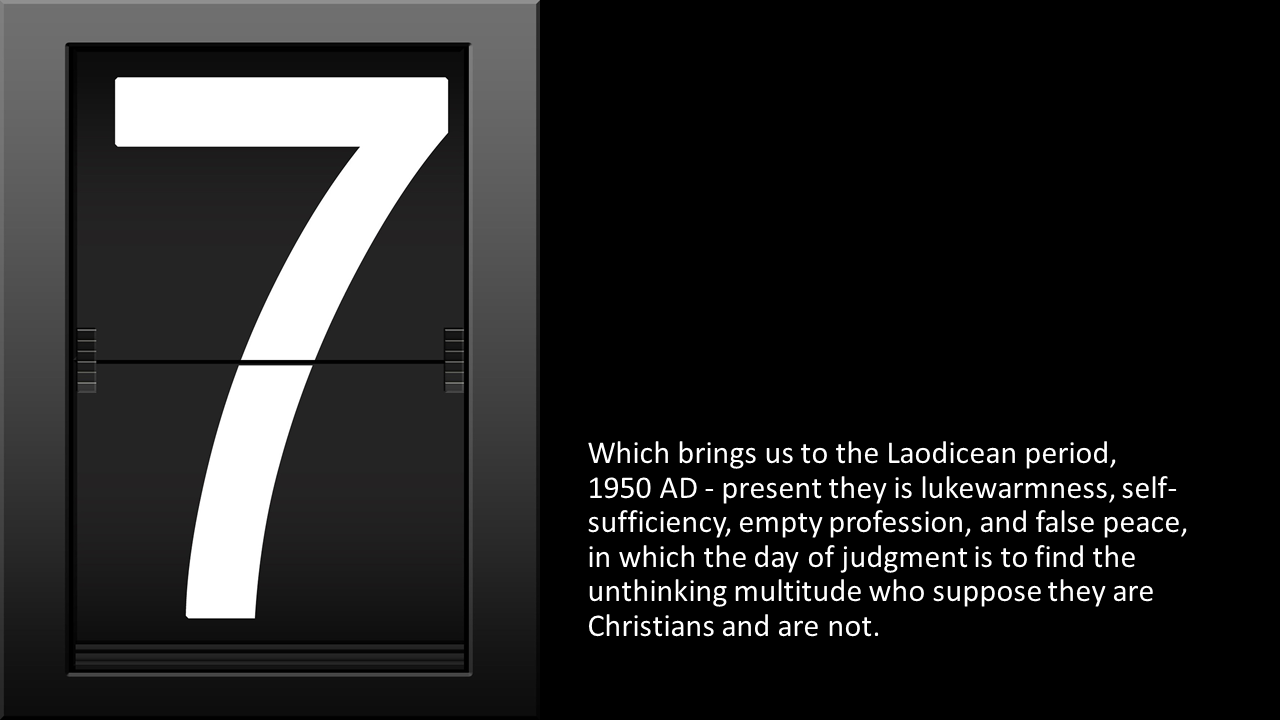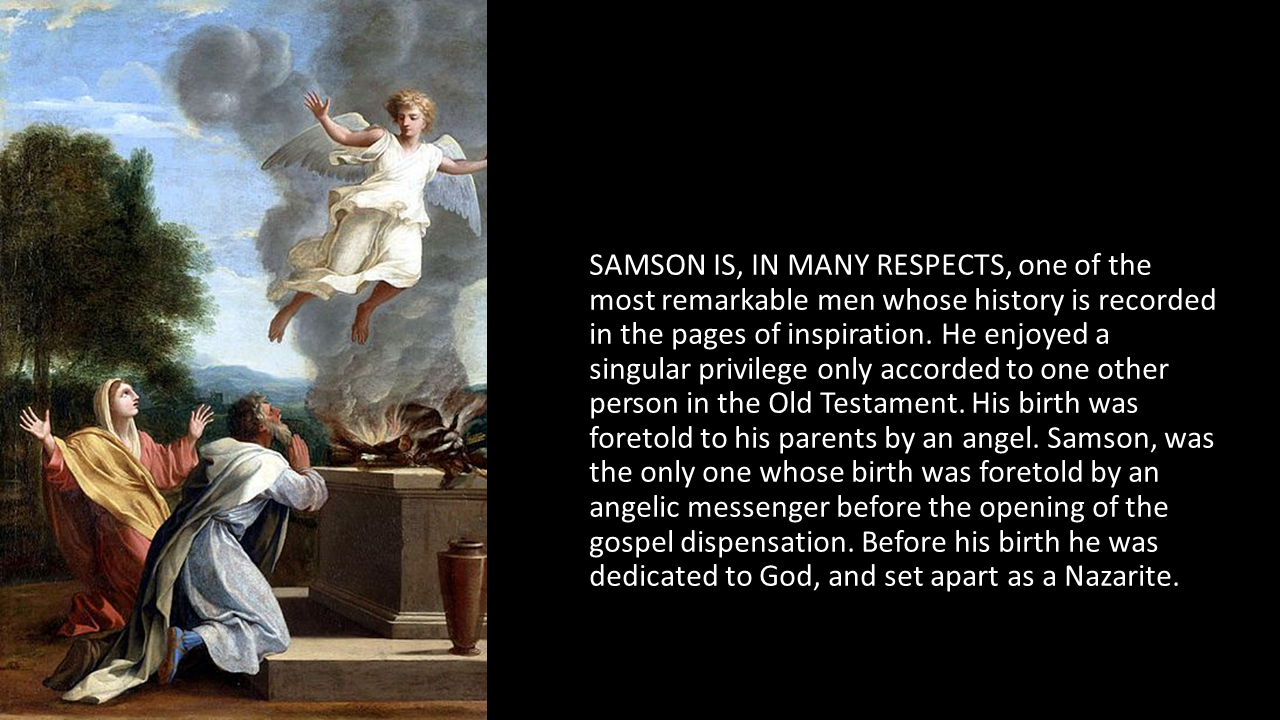030601PM
BIO-12 NR2-24 WTB-51
STONES-17 PERGAMOS THE STONES OF GOD’S WITNESS: PERGAMOS– LESSONS IN LIVING AT THE END OF DAYS THE DANGER OF THE COMPROMISED CHRISTIAN
 God’s Word records that Sampson’s life pictures compromise.
God’s Word records that Sampson’s life pictures compromise.
Great blessing and strength in one area of our lives does not make up for neglect and weakness in another area of our lives.
Knowing the presence of God does not automatically overwhelm our will, we must choose to obey or we will disobey! o God uses men and women of faith in spite of their failures!
SLIDE ONE: READ REVELATION 2.12-17
MEET THE ASSEMBLY GOD CAN GROW HIS CHURCH ANYWHERE! Revelation 2:12a
First the Assembly – The word Pergamum literally means, “mixed marriage”.
1. Geographically: lush and fertile land — this city was 80 miles north of Smyrna, 15 miles inland from the Aegean on a hill 1000 feet above the fertile valleys.
2. Historically: ancient — in 95 AD as John wrote it was an old city, it had been the capital of Asia Minor for 300 years.
3. Culturally: academic — it was a university town (with the largest library in the ancient world rivaling with Alexandria) w/200,000 volumes, in fact, Pergamos is noted for parchment (boiled animal skins) that books were written on.
4. Reputation: exciting — it was a sacred (to pagans) city.
Dionysus (Bacchus) worship – gods of orgies, wine, and debauchery. Zeus worship (King of Greek/Roman Gods) Largest and most famous wonders of the ancient world. The altar of Zeus was extending 40’ over cliff. Satan’s throne ( He was running his global operation out of this city) Ephesians 6 – thrones, dominions. Two times says it, look at you. Ascelapius worship (God of healers) – snakes that slithered over people on dark and wet floors to cure them.
5. Result: alluring — So this assembly was right in the middle of: The IMMORALITY CENTER OF THE ANCIENT WORLD. Bacchus/Dionysus. The IDOLATRY CENTER OF THE ANCIENT WORLD to the king of the gods of the pagan Graeco-Roman religion of Zeus or Jupiter. The FALSE HEALING CENTER OF THE ANCIENT WORLD with drug induced stupors, snakes, and the false god of healing: Ascelapius. Finally, SATANIC CENTER OF THE ANCIENT WORLD, the Devil himself had a personal throne there for the time as headquarters for his global rebellion.
And in that place was a church… the assembly at Pergamum. Lesson One, Christ can save! The vilest offender who truly believes, that moment, from Jesus, a pardon receives.
SLIDE 2: LESSONS IN LIVING AT THE END OF DAYS
 It warns of the deadly sin of being in love and communion with that which God has condemned and will destroy…..G has told us there is only one action to take when confronted with worldliness and apostasy: SEPARATE FROM IT!
It warns of the deadly sin of being in love and communion with that which God has condemned and will destroy…..G has told us there is only one action to take when confronted with worldliness and apostasy: SEPARATE FROM IT!
SLIDE 3: VERSES
2 Corinthians 6:14-17 Do not be unequally yoked together with unbelievers. For what fellowship has righteousness with lawlessness? And what communion has light with darkness?15 And what accord has Christ with Belial? Or what part has a believer with an unbeliever?16 And what agreement has the temple of God with idols? For you are the temple of the living God. As God has said: “I will dwell in them And walk among them. I will be their God, And they shall be My people.” 17 Therefore “Come out from among them And be separate, says the Lord. Do not touch what is unclean, And I will receive you.”
James 4:4-8 Adulterers and adulteresses! Do you not know that friendship with the world is enmity with God? Whoever therefore wants to be a friend of the world makes himself an enemy of God.5 Or do you think that the Scripture says in vain, “The Spirit who dwells in us yearns jealously”? 7 Therefore submit to God. Resist the devil and he will flee from you.8 Draw near to God and He will draw near to you. Cleanse your hands, you sinners; and purify your hearts, you doubleminded.
1 John 2:15-17 Do not love the world or the things in the world. If anyone loves the world, the love of the Father is not in him.16 For all that is in the world—the lust of the flesh, the lust of the eyes, and the pride of life—is not of the Father but is of the world.17 And the world is passing away, and the lust of it; but he who does the will of God abides forever. (Remember how the Apostle John dealt with the infidel apostate Celsius? He ran out of the bath house when he was told Celsius was in there!)
Revelation 18:1-4 And after these things I saw another angel come down from heaven, having great power; and the earth was lightened with his glory. 2 And he cried mightily with a strong voice, saying, Babylon the great is fallen, is fallen, and is become the habitation of devils, and the hold of every foul spirit, and a cage of every unclean and hateful bird. 3 For all nations have drunk of the wine of the wrath of her fornication, and the kings of the earth have committed fornication with her, and the merchants of the earth are waxed rich through the abundance of her delicacies. 4 And I heard another voice from heaven, saying, Come out of her, my people, that ye be not partakers of her sins, and that ye receive not of her plagues.
SLIDE: Antipas Rev 2.13 martyr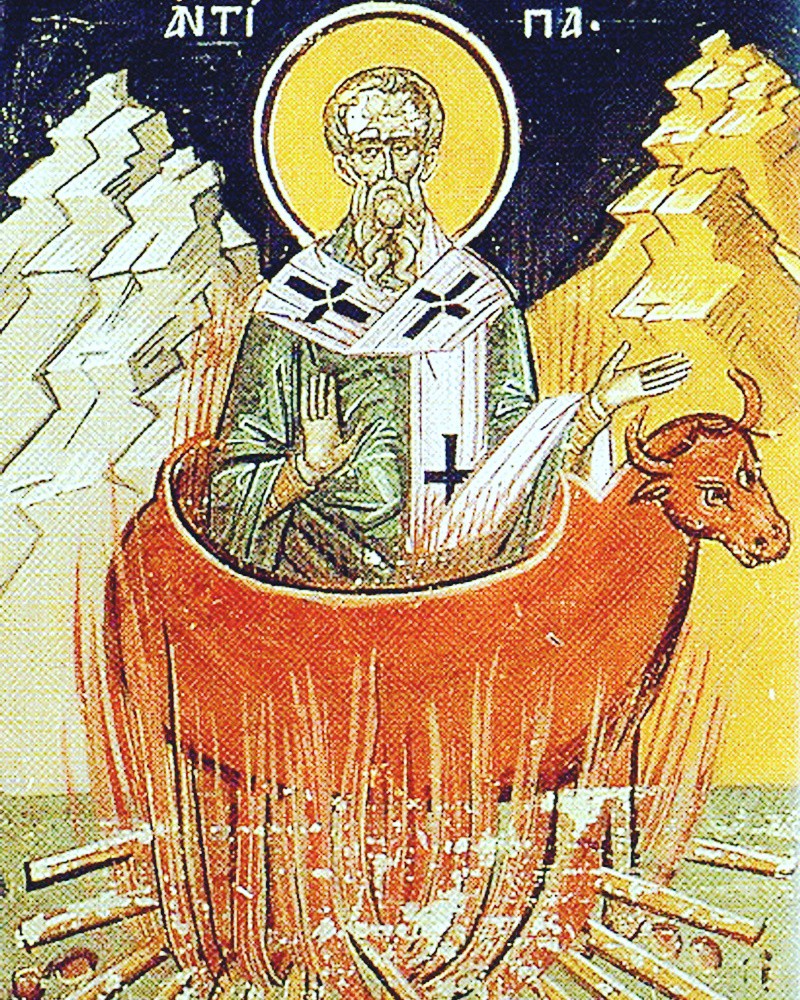
SLIDE: SEVEN CHURCHES: Christ’s & Paul’s
SLIDE: SEVEN PARABLES
SLIDE: SEVEN AGES
THE PROPHETIC MESSAGE: THERE WILL BE SEVEN STAGES OF CHURCH HISTORY I ALWAYS WILL BE WITH YOU!
CHRIST FADING FROM HIS CHURCH: The Church throughout the Ages: SEVEN SUCCESSIVE STAGES1 IN CHURCH HISTORY. For just a moment, let me give you a perspective- there are seven letters in Revelation 2 – 3 that give us the church in prophetic perspective – the church from Christians ascension until He comes to take His church – from century one to the rapture. In the first place, the seven Churches represent seven phases or periods in the Church’s history, stretching from the time of the apostles to the coming again of Christ, the characteristics of which are set forth partly in the names of these churches, but more fully in the epistles addressed to them.
There was the Ephesian period–30-60 AD a period of warmth and love and labor for Christ, dating directly from the apostles, in which defection began by the gradual cooling of the love of some, the false professions of others and the incoming of undue exaltations of the clergy and church offices.
Then came the Smyrna period–60 -300 AD the era of martyrdom, and of the sweet savor unto God of faithfulness unto death, but marked with further developments of defection in the establishment of castes and orders, the license of Judaizing propensities, and consequent departures from the true simplicities of the Gospel.
Then followed the Pergamite period, 300-500 AD in which true faith more and more disappeared from view, and clericalism gradually formed itself into system, and the church united with the world, and Babylon began to rear itself aloft.
Then came the Thyatiran period– 500-1500 AD the age of purple and glory for the corrupt priesthood, and of darkness of truth; the age of effeminacy and clerical domination, when the church usurped the place of Christ, and the witness of Jesus were given dungeons, stakes, and inquisitions; the age of the enthronement of false prophetess, reaching to the days of Luther and the Reformation.
Then came the Sardian period–1500-1800 AD the age of separation and return of the rule of Christ; an age of many worthy names, but marked with deadness withal, and having much of which to repent; an age covering the spiritual lethargy of the Protestant centuries before the great evangelical movements of the last hundred years.
Next was the Philadelphian period 1800-1950 AD is a time of great missionary fervor, evangelistic outreach and devotional godliness. In this time the world was penetrated with the gospel like no time since Pentecost.
Which brings us to the Laodicean period, 1950 AD – present they is lukewarmness, self-sufficiency, empty profession, and false peace, in which the day of judgment is to find the unthinking multitude who suppose they are Christians and are not.
SLIDE TWELVE: SEVEN TYPES
The universal message: ALL CHURCHES THROUGHOUT ALL OF HISTORY — I ALWAYS EXPECT YOUR DEVOTION!
CHRIST WAITING FOR HIS CHURCH: The Church in every Age: SEVEN KINDS OF CHRISTIANS. In the next place, the seven churches represent seven varieties of Christians, true and false. Every professor of Christianity is like one of these seven. This morning more than likely G has classified and found here:
Some Ephesian Christians, with a great start but a lack of that initial consuming love.
Some Smyrnan Christians purified by persecution, faithful at all costs to the Lord.
Some Pergamite Christians, wed to the world, a country club Christian with no standards, with a focus and grip on money, car and job, only doing what is socially acceptable, compromising Scriptures absolutes, more concerned with fashion than with Holiness.
Some Thyatiran Christians believing and following false doctrine, with a social gospel not a divine call to the new birth.
Some Sardian Christians, dead as last weeks cut flowers, cold and lifeless, in a spiritual stupor.
Some Philadelphian Christians, sound in doctrine, zealous in ministry, outreaching the world and deeply in love with the Lord Jesus Christ!
Some Laodicean, apostate, counterfeit and sickening to Christ. A member of the Christless church that will thrive in the tribulation under Satan’s leadership.
It is of these seven sorts that the whole church is made up. So in a most emphatic way, if you are a born again Christian, this letter is addressed to you—REMEMBER – REPENT – REPEAT
SLIDE FOURTEEN: HOLD FAST! v. 13
So what’s the ultimate lesson? Well, the church at Pergamum had a problem…some had lost these vital birthrights of being born again. They had lost their PURITY, THEIR INTIMACY and THEIR NOURISHMENT. How? Because they got too close to the world by mixing with them, or marrying them, or loving the system.
So Jesus lovingly offers a solution to theirs and sometimes our woeful problems.
If you have lost your purity – Christ says, Come back and I’ll give you my white stone. Do you want Christ’s purity? Let Him wash and cleanse you and make you pure, as white as snow.
If you have lost your intimacy – Christ says, Come back and I’ll give you my new name. Do you want Christ’s intimacy? Let Him start drawing you to spend time alone with Him, He’s waiting for you.
If you have lost your nourishment – Christ says, Come back and I’ll give you my hidden manna. Do you want Christ Jesus to help you grow? Let Him start feeding you in His word.
If you have lost your focus – Christ says, Come back and I’ll give you my new ears, listen. Do you want Christ’s focus? Then go back to listening to Christ speaking to you in the word.
SAMSON2 IS, IN MANY RESPECTS, one of the most remarkable men whose history is recorded in the pages of inspiration. He enjoyed a singular privilege only accorded to one other person in the Old Testament. His birth was foretold to his parents by an angel. Isaac was promised to Abraham and Sarah by angels whom they entertained unawares; but save Isaac, Samson was the only one whose birth was foretold by an angelic messenger before the opening of the gospel dispensation. Before his birth he was dedicated to God, and set apart as a Nazarite. Now, a Nazarite was a person who was entirely consecrated to God, and in token of his consecration he drank no wine; and allowed his hair to grow, untouched by the razor. Samson, you may therefore understand, was entirely consecrated to God, and when any saw him, they would say, 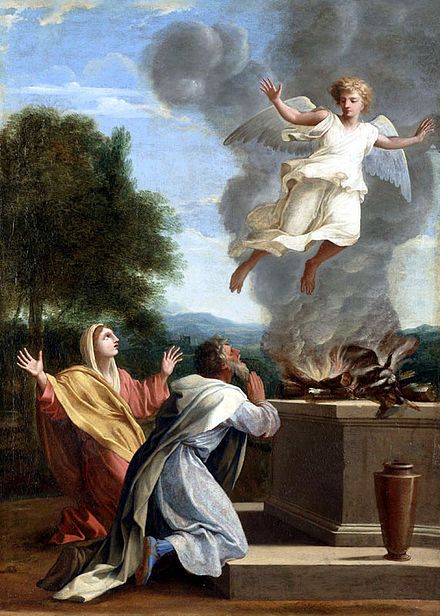 “That man is God’s man, a Nazarite, set apart.” God endowed Samson with supernatural strength.
“That man is God’s man, a Nazarite, set apart.” God endowed Samson with supernatural strength.
Every way it must have been a great thing to see this man, especially if one had him for a friend. Had one been his foe, the more distant the sight the better, for none could escape from him but those who fled; but to have him for a friend and to stand with him in the day of battle, was to feel that you had an army in a single man, and had in one frame that which would strike thousands with terror. Samson, however, though he had great physical strength, had but little mental force, and even less spiritual power. His whole life is a scene of miracles and follies. He had but little grace, and was easily overcome by temptation. He is enticed and led astray. Often corrected; still he sins again.
At last he falls into the hands of Delilah. She is bribed with an enormous sum, and she endeavors to get from him the secret of his strength. He foolishly toys with the danger, and plays with his own destruction. At last goaded by her importunity, he lets out the secret which he ought to have confided to no one but himself. The secret of his strength lay in his locks. Not that his hair made him strong; but that his hair was the symbol of his consecration, and was the pledge of God’s favor to him.
While his hair was untouched he was a consecrated man; as soon as that was cut away, he was no longer perfectly consecrated, and then his strength departed from him. His hair is cut away; the Philistines begin to oppress him, and his eyes are burned out with hot iron. How are the mighty fallen!
And now he comes to the very city out of which he had walked in all his pride with the gates and bolts upon his shoulders; and the little children come out, the lower orders of the people come round about him, and point at him – “Samson, the great hero, hath fallen! let us make sport of him!” What a spectacle!
Why, he must be the sport and jest of every passer by, and of every fool who shall step in to see this great wonder – the destroyer of the Philistines made to toil at the mill. Ah, what a fall was there, my brethren! We might indeed stand and weep over poor blind Samson. That he should have lost his eyes was terrible; that he should have lost his strength was worse; but that he should have lost the favor of God for a while; that he should become the sport of God’s enemies, was the worst of all. Over this indeed we might weep.
First, THE STRENGTH OF THE CONSECRATED MAN. Do you know that the strongest man in all the world is a consecrated man? 1 Corinthians 6:19-20 Or do you not know that your body is the temple of the Holy Spirit who is in you, whom you have from God, and you are not your own? 20 For you were bought at a price; therefore glorify God in your body and in your spirit, which are God’s.
Now, in the second place, THE SECRET OF THEIR STRENGTH. The secret of Samson’s strength was this – as long as he was consecrated he should be strong; so long as he was thoroughly devoted to his God, and had no object but to serve God. Without his God he is but as other men. The secret of his strength lies in his consecration, and in the strength which is its result. Remember, then, the secret of your strength. Never think that you have any power of your own; rely wholly upon the God of Israel; and remember that the channel through which that strength must come to you must be your entire consecration to God.
Zechariah 4:6 So he answered and said to me: “This is the word of the Lord to Zerubbabel: ‘Not by might nor by power, but by My Spirit,’ Says the Lord of hosts.
Jeremiah 9:23-24 Thus says the Lord: “Let not the wise man glory in his wisdom, Let not the mighty man glory in his might, Nor let the rich man glory in his riches; 24 But let him who glories glory in this, That he understands and knows Me, That I am the Lord, exercising lovingkindness, judgment, and righteousness in the earth. For in these I delight,” says the Lord. 16:29, 30 Some Philistine temples had roofs overlooking a courtyard, above wooden columns planted on stone foundations. The central pillars were set close to furnish extra support for the roof. Here the victory celebration and taunts flung at the prisoner below drew a big crowd. The full strength of Samson, renewed by God, enabled him to buckle the columns. As a result, the roof collapsed and the victory was Israel’s, not Philistia’s. He died for the cause of his country and his God. He was not committing suicide, but rather bringing God’s judgment on His enemies and willing to leave his own life or death to God. He was the greatest champion of all Israel, yet a man of passion capable of severe sin. Still, he is in the list of the faithful (cf. Heb. 11:32).3 1. First, Samson was dominated by lust. That passion led Samson to desire a Philistine woman as a wife, which was strictly forbidden by God’s Law. In addition, that passion led him to liaisons with prostitutes, like the one with the woman Delilah who betrayed him for money. 2. Second, Samson was driven by pride and revenge. He was more moved by anger at personal affronts to strike out at the Philistines than he was moved by the suffering of the people he was supposed to lead (cf. 14:19– 20; 15:7–8; 16:28). 3. Third, Samson was defeated by himself. We can hardly imagine what Samson, with his great strength and godly heritage, might have been. If only he had lived out daily the formal commitment to God expressed in that Nazarite vow.4
at personal affronts to strike out at the Philistines than he was moved by the suffering of the people he was supposed to lead (cf. 14:19– 20; 15:7–8; 16:28). 3. Third, Samson was defeated by himself. We can hardly imagine what Samson, with his great strength and godly heritage, might have been. If only he had lived out daily the formal commitment to God expressed in that Nazarite vow.4
Few accounts in the Bible are as tragic as this one. Here is a man to whom God gave twenty years’ time to begin to overcome the enemy, yet in the end, he himself was overcome by the enemy. Samson’s history is an illustration of Paul’s warning in 1 Cor. 9:27, for Samson was a castaway. Hebrews 11:32 cites him for his faith in God’s Word, but apart from this, very little can be said on his behalf. “Let him who thinks he stands take heed lest he fall” (1 Cor. 10:12, NKJV). Note the steps that led to Samson’s sin and tragic end.
I. He Despised His Heritage (13)
Samson was born into a godly home, to parents who believed in prayer. He was God’s special gift to them and to the nation. He had a father who prayed, “Teach us what we shall do unto the child” (v. 8; and see v. 12). His parents had a fear of God and tried to instill this same fear in their son. They brought offerings to God and dared to believe His wonderful promises. God gave to Samson a special enduement of the Holy Spirit that made him a conqueror. God called Samson to be a Nazarite (“separated one”), wholly surrendered to the Lord. According to Num. 6, a Nazarite was never to drink strong drink or touch a dead body; and the mark of his dedication would be his uncut hair. All of this wonderful heritage the grown Samson despised! Instead of putting himself in God’s hands to accomplish his God-given task, he chose to live to please himself. How tragic it is when God gives a young person a wonderful heritage and a great opportunity, and he or she treats it lightly.
II. He Defied His Parents (14:1–4)
One evidence of spiritual decline can be the way we get along with our loved ones. “Samson went down…” (14:1) is true both spiritually and geographically. Instead of staying in the borders of Israel, he went into enemy territory and fell in love with a heathen woman. He knew the laws of separation God had given to the Jews, but he chose to ignore them (see Ex. 34:16; Deut. 7:3; and 2 Cor. 6:14–18; also Gen. 24:1–4). Note that he told his parents; he did not ask them. And when they reminded him of God’s law, he defied them. “Get her for me,” he insisted, “for she pleases me well!” It did not bother Samson that his desires displeased his parents. Note that in this instance God mercifully was going to overrule his sin and use it to weaken the Philistines (v. 4). Christian young people need to stop and consider carefully when they find themselves defying godly parents who know God’s Word.
III. He Defiled His Body (14:5–20)
In those days, the parents arranged for a marriage, and there was several months time between the engagement and the wedding. When Samson met the lion, God gave him the power to overcome it even though Samson was not walking completely in God’s will. When he came back months later to complete the marriage, he found honey in the carcass of the lion. Numbers 6:6–9 tells us that a Nazarite was never to touch a dead body, but Samson deliberately defiled himself for the sake of the honey! How many Christians today defile themselves just to enjoy a little honey in the carcass of a lion— perhaps a popular book, a movie, or a questionable friendship. Sad to say, Samson passed the sin along to his parents, and then he made a joke about it to entertain his friends! As a Nazarite and a Jew, he had no right to be sharing in a worldly Philistine wedding. The marriage was never completed, but the seeds of sin had already been planted in his heart.
IV. He Disregarded God’s Warning (15)
This is a chapter of seeming victories, yet it ends with the “strong man” utterly exhausted for lack of water. He burned the fields of the Philistines, but they turned around and burned the house of the woman he had loved (15:6 with 14:15). Samson avenged their death, but then his own people turned against him and delivered him to the enemy (vv. 11–13). God delivered him, but then God warned him by showing him how weak he was. We find only two prayers of Samson: here, for water (vv. 18–20), and in 16:28, for strength to destroy the Philistines. His parents had been prayerful people, but Samson had not followed their example. God warned him here, but he would not heed the warning.
V. He Deliberately Played with Sin (16)
Samson had already gotten into trouble with one woman, but now he tried again, this time going deep into enemy territory to Gaza. Again, God warned him by allowing the enemy to almost catch him, but Samson still refused to repent. It was then that Delilah came into his life and led him to his doom. The Valley of Sorek was near his home, but Samson’s heart was already far from God. It shocks us to see this Nazarite sleeping on the lap of a wicked woman, but this is what happens when people choose to go their own way and reject the counsel of loved ones and the Lord. Three times Delilah enticed Samson, and three times he lied to her. Each time, the enemy attacked him, so he should have realized he was in danger. But read Prov. 7:21–27 to see why Samson yielded. He was asleep when he should have been awake! Remember the warning Christ gave to Peter in Matt. 26:40–41. Note that each lie Samson told actually took him closer to the truth. How dangerous it is to play with sin. The rest of the story shows the tragic end of the believer who will not let God have his way with his life. From v. 20 on, Samson does nothing but lose.
He loses his hair, the symbol of his Nazarite dedication; for that dedication had long since been abandoned.
Then he loses his strength, but he is ignorant of it until he is overpowered. How futile it is for the servant of God to try to serve the Lord when out of His will.
Next Samson loses the light, for the Philistines put out his eyes. o He loses his liberty, for they bind him with fetters of brass.
He loses his usefulness to the Lord, for he ends up grinding corn instead of fighting God’s battles. Someone has said that v. 21 pictures the blinding, binding, and grinding results of sin. And all of this began when Samson despised his blessings and defied his parents!
Samson also lost his testimony, for he was the laughingstock of the Philistines. Their fish-god Dagon, not the God of Israel, was given all the glory. Apparently Samson repented of his sin, for God gave him one more chance to act by faith. His hair had begun to grow and Samson asked God for strength to win one more victory over the enemy. God answered his prayer, but in defeating others, Samson took his own life. Like Saul, Samson was a castaway; he had committed sin unto death, and God had to take him off the scene (see 1 Cor. 11:30–31; 1 John 5:16–17). His loved ones claimed his body and buried him “between Zorah and Eshtaol”—the very place where he had started his ministry (13:25). o Samson illustrates people who have power to conquer others, but who cannot conquer themselves. He set the Philistine fields on fire, but could not control the fires of his own lust. He killed a lion, but would not put to death the passions of the flesh. He could easily break the bonds that men put on him, but the shackles of sin gradually grew stronger on his soul. Instead of leading the nation, he preferred to work independently, and as a result, left no permanent victory behind. He was remembered for what he destroyed, not for what he built up. He lacked discipline and direction; without these, his strength could accomplish little. He failed to check the impulses that began early in his career, and twenty years later, they killed him. It remained for Samuel and David in later years to finally defeat the Philistines. Samuel by one prayer accomplished more than Samson did in twenty years of fighting (see 1 Sam. 7:9–14).5
1 This material drawn from J.A. Seiss, The Apocalypse, pp.
2 Delivered on Sabbath Morning, November 21st, 1858, by the REV. C. H. SPURGEON at the Music Hall, Royal Surrey Gardens. Sermon # 224. http://thebiblerevival.com/teachings/books/0008/0224.htm
3John F. MacArthur, Jr., The MacArthur Study Bible, (Dallas: Word Publishing) 1997.
4 Richards, Lawrence O., The Teacher’s Commentary, (Wheaton, IL: Victor Books) 1987.
5Warren W. Wiersbe, Wiersbe’s Expository Outlines on the Old Testament, (Tyndale House Publishers, Inc.: The Intimate Marriage) Wheaton, Illinois.
Slides
Check Out All The Sermons In The Series
You can find all the sermons and short clips from this series, Scriptural Biographies – Peter here.
You can find all the sermons and short clips from this series, The Message Of Jesus here.
You can find all the sermons and short clips from this series, World of The Bible here.
Looking To Study The Bible Like Dr. Barnett?
Dr. Barnett has curated an Amazon page with a large collection of resources he uses in his study of God’s Word. You can check it out here.



